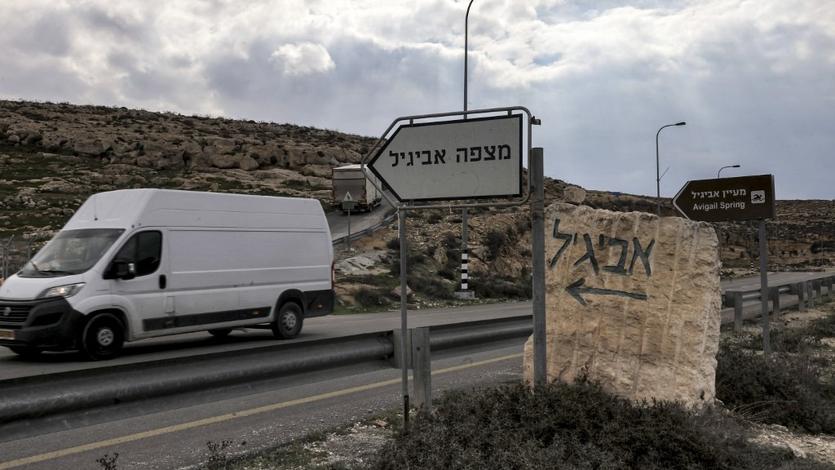 Cars drive past the entrance of Avigayil, an Israeli outpost located in the south of the occupied West Bank, on Feb 13, 2023. (PHOTO / AFP)
Cars drive past the entrance of Avigayil, an Israeli outpost located in the south of the occupied West Bank, on Feb 13, 2023. (PHOTO / AFP)
BEIT HOGLA SETTLEMENT — Between Jericho and the Dead Sea, Israeli settlers rejoice after the government granted their outpost retroactive approval. An hour's drive north, others are beaten by officers evicting an unsanctioned settler vineyard.
Drawing Western concern and Palestinian anger, Prime Minister Benjamin Netanyahu's government authorised nine settler outposts in the occupied West Bank this week, in response to two Palestinian street attacks in which nine Israelis were killed.
Since the 1967 war, Israel has established around 140 settlements on land Palestinians see as the core of a future state. Besides the authorised settlements, groups of settlers have built scores of outposts without government permission
On hearing the news from the government on Sunday night, the young men of Beit Hogla, a cluster of mobile homes housing around 35 families neatly set up near a desert road, broke into a dance.
READ MORE: Israel, Palestine risk deeper conflict in a distracted world
"We had tears in our eyes. It was very joyful," said Yagel Shmuel, a 31-year-old father of four who came to live in Beit Hogla seven years ago with four other families.
The formal recognition will make it easier to pave roads, and build schools for the settlement's 100 children, said Shmuel. "We hope the government's decision will bring us a lot of families and we can build here a big settlement."
Since the 1967 war, Israel has established around 140 settlements on land Palestinians see as the core of a future state. Besides the authorised settlements, groups of settlers have built scores of outposts without government permission.
Some, like the vineyard uprooted on Wednesday, have been razed by Israeli security forces. Others were authorised retroactively. The nine granted approval on Sunday are the first for Netanyahu's new nationalist, religious government.
Palestinian officials have denounced the move as a provocation and called on world powers to back up verbal condemnation with action against Israel.
Most world powers deem settlements built in the territory Israel seized in the 1967 war as illegal under international law and their expansion as an obstacle to peace, since they eat away at land the Palestinians claim for a future state.
Israel disputes the illegality of the settlements and cites Biblical and historical ties to the West Bank, which it calls by its Biblical name - Judea and Samaria.
Ideological settlers believe they are pioneers redeeming land promised by God to the Jewish people. Legalising outposts was one of the main promises Netanyahu's Likud party made to their leaders in coalition deals following the Nov 1 election.
"This is the most important thing we have," said Shmuel.
More than 450,000 people, or less than 5% of Israel’s population, are Jewish settlers in the West Bank, home to about 3 million Palestinians who exercise limited self-rule there.
While the leaders of the pro-settler parties Religious Zionism and Jewish Power celebrated the authorisation of the outposts, the vineyard's uprooting on Wednesday exposed cracks in the government.
Religious Zionism leader, Finance Minister Bezalel Smotrich, denounced the uprooting and blamed Defence Minister Yoav Gallant for ignoring their coalition deal granting him increased powers in the West Bank over settlement expansion.
READ MORE: Blinken urges Israeli-Palestinian calm as violence flares
Footage showing some border police men beating settlers who tried to stop the eviction further aggravated Smotrich and his ally, National Security Minister Itamar Ben-Gvir.
"This is not what we had hoped for. We joined this government based on a promise by Prime Minister Netanyahu that this would be a full-fledged right-wing government," Ben-Gvir said in a statement.
The border police said three officers had been suspended pending further investigation.


